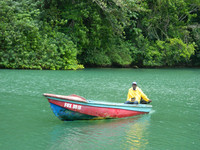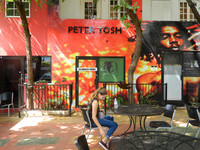By Steve Bergsman
I was in Kingston attending a small conclave of local filmmakers sponsored by the Jamaica Film and Television Association. After viewing five short films, each of the filmmakers got to answer questions from the media. After listening to all the chatter, I interjected with this simple question, "Does anyone remember 'The Harder they Come'?" This was probably the most important film to come out of Jamaica as it introduced the world to the sounds of reggae music.
An older man who had been introduced as a professor from the University of the West Indies and hadn't yet said a word, answered: "I was the cinematographer on that movie."
After the meeting ended, I ran up to shake his hand. His name was Flanklyn St. Juste, and I couldn't wait to talk to him about the movie. This guy was a legend.
"The Harder They Come" ran in art-house cinemas for years, and the soundtrack to the movie became a best-selling album. It also made a star of Jimmy Cliff, who not only was the leading actor but wrote and sang many of the songs used in the movie.
"So what was it like to film Jimmy Cliff," I asked.
St. Juste smiled: "Well, when he showed up he was great."
Reggae is one of the great pop music streams in the world, and other than the Bob Marley Museum, which was first opened in the late 1980s by Marley's widow, Rita Marley, I always felt Jamaica never really honored its artistic contribution.
So while there isn't a national Jamaica music museum, visitors can get closer to the roots of reggae music than ever before because in 2016 Kingston celebrated the opening of the Peter Tosh Museum.
Tosh is less remembered today than Marley, but the two were co-founders (along with Bunny Wailer) of the legendary reggae group, The Wailers. Tosh was even more revolutionary than Marley, and he is most remembered for his controversial hit, "Legalize It," and his guitar, which was in the shape of an M16 rifle.
Tosh was killed in 1987, when gunmen broke into his house to rob him.
Located at the grand-sounding Peter Tosh Square, the museum is actually tucked into a shopping center on Kingston's Trafalgar Road. It's a small museum with the highlight being Tosh's famous M16 guitar and other personal artifacts, including a Grammy award and his unicycle.
Since there is no reggae museum, per se, taken together the Bob Marley Museum and the Peter Tosh Museum are the closest one will get to a historical appreciation of this great musical innovation.
It should be noted reggae didn't just spring out of the void. It's earliest direct antecedent was a form of Jamaican folk music called mento, generally featuring a guitar, banjo and the unusual rumba box (evolved from the mbira, an African instrument), which was sat on while being played.
One of the most famous mento groups was The Jolly Boys, and the original iteration of the band was formed in 1946. Over the decades the group dissolved, split, re-formed and reorganized about a dozen times, but, unbelievably, it survives to this day. I caught up with The Jolly Boys one night at the Geejam Hotel in Port Antonio. It was no accident that they were there the night I went for dinner because when these musicians are not touring they are the house band at the Geejam.
And that's no accident, either. The Geejam Hotel was created by famed record producer John Baker, who also built the Geejam recording studio on the property. There are only 17 rooms at the Geejam Hotel, and anyone who has to ask for the price probably shouldn't be staying there. But even for the common folk, it's a great place to have dinner and drinks and listen to the music. And they might even run into someone like Alicia Keys or John Legend or Sade or Snoop Dogg or Gwen Stefani, all of whom have come to Geejam Studios to record and hang out in grand luxury for a few days.
And that's only a short list; a longer list of musicians who have recorded at Geejam would take up a couple of typewritten pages. The one artist the staff recalls with deep affection is Amy Winehouse. I won't say which room she stayed in while at Geejam, but I got to visit it with a young journalist who wanted her picture taken on the bed where Any Winehouse once slept.
As for me, it was a thrill to visit the recording studio and fake-use the studio's control board and fake-play some of the house instruments. I use the adjective "fake" because I actually have no musical talent whatsoever, so I lived in the moment vicariously.
The studio is fairly bare-bones with few adornments. However, I noticed leaning against the wall an original Sex Pistols poster signed by the artist Jamie Reid. Also visiting the same day I did was a couple from Great Britain who were guests at the hotel. When the man saw the poster his eyes lit up.
"I can't believe they have that here," he said. "My wife bought me four Sex Pistols posters, including that one."
I caught up with the couple later that evening when The Jolly Boys were playing. They never told me what they did, but I was curious since they were guests at the hotel. However, I did have a tip for them. Knowing their penchant for such pop art manifestations as posters I told them they needed to visit the Sanwood villa because on the stairwell there were two graffiti drawings left by one anonymous guest. The small mouse scribblings were a gift from Banksy, the reclusive graffiti artist, whose street art, if it can be preserved, is worth millions.
Above the stairwell to Sanwood are numerous posters, one of which is of Grace Jones, who wrote to John Baker about her stay at Geejam: "I came. You saw. You conquered."
WHEN YOU GO
The nearest major airport is Kingston, both for the city and for Port Antonio. Over land, it is a rough two-hour drive from Kingston to Port Antonio whether you take private car, van service, taxi or bus.
The accommodations in Kingston are getting better all the time. I stayed at the Courtleigh Hotel and Suites near Emancipation Park. Pool, bar, restaurant and room were all great. In Port Antonio I stayed at the Goblin Hill Villas, which, as the name implies, offers villa accommodations. The Geejam Hotel is probably one of the best in Jamaica, but one has to be a rock star to stay there.


Steve Bergsman is a freelance writer. To read features by other Creators Syndicate writers and cartoonists, visit the Creators Syndicate website at www.creators.com.






View Comments